A strong family dynamic is massively important to a child’s development. But what about the cases where a parent or parents can’t be present for a child? That’s where foster parents come into play.
Foster care is an essential service for children, youths and families who may be forced to live apart for a period of time due to a number of different reasons.
Read More:
- Saskatchewan mothers inspire with boundless love, talent and bravery
- A mother’s miracle: Ferland’s journey from preemie to pro football
- How modern motherhood compares to my great-grandmother’s struggles
Foster parents have a tremendous part to play in those situations, helping kids thrive and giving them someone they can rely on.
Ahead of Mother’s Day, Evan Bray spoke to Deb Davies, executive director of the Saskatchewan Foster Families Association, about the importance of foster parents and their role in helping youths.
Listen to the interview, or read the transcript below:
The following questions and answers have been edited for length and clarity.
EVAN BRAY: What is the importance of Mother’s Day when you look at it through the vantage of a foster family?
DEB DAVIES: I think that the importance of Mother’s Day is just the whole family. We want to be there in the community to be able to respond when children and families need that support, so mothers, fathers, everyone plays such an important part. We always say that it takes a village to raise a child, but it really takes a community to support a family.
I know you’ve got experience in this. You were a foster parent, so can you talk about it from your own perspective?
I fostered for a number of years, and I can tell you that it was one of the most rewarding things that I could have ever done, and the people that I’ve gained in my life, you can’t even put words to explain how enriching that is. I still have contact 20 years later with children or young people that I helped support.
Can you talk about Mother’s Day from the vantage point of the kids – the children who are in foster care?
When I fostered, I always talked about co-parenting with families. I wasn’t taking the place of a mom or a dad. I was co-parenting with their family. We were there to support the children. And again, if we can support families, that just strengthens our children’s future.
What role do you see foster parents playing in society?
I believe that foster families play a very important role in strengthening our community. You know, some people don’t understand what the role of the foster parent is, but it’s supporting not only the children but the community, because we want to make sure that children have a bright future and really positive outcomes.
What should people consider when they’re thinking about becoming a foster family?
I think that you have to make sure that you’re conscientious, that you’re going to be welcoming the partnership of working with a family. It’s not that children who come into foster care don’t ever get to see their families, because we really encourage that. We need to keep children connected to their families (and) to their community, so you have to be very flexible, very open-minded and very adaptable, because you know each family lives life differently. So we have to be very adaptable and understanding of different people’s situations.
Are you always looking for people to step into the role of foster families? Or do you have enough that do this in the province?
We’re always looking for more families. We want to be there to be able to respond. There’s not children waiting to come into foster care, but we want to be able to be there to have enough families to be able to respond to the need, and presently we’re running a Mother’s Day campaign through Canada Post, and just reaching out to households, to families, and saying “Would you be interested?” Because the other thing is, Evan, we have not only just fostering in our organization. We have a program that’s called the In Home Support Program where we employ people all over the province that go in and support families. So if we have a grandmother who’s caring with her children and they’re connected to the Ministry of Social Services, we can go in and support that grandmother or that family to be able to maintain the children in their community and in their families. So there are many different ways of helping. It’s not just fostering… it’s about families helping families, and we really want to strengthen our families for our future.
Are there misconceptions out there that float around about foster care? Anything that you deal with constantly, or have to fact check people on?
One of the myths is that when children come into care, they never get to go home. That’s not the case. We are always working with families, and we work very closely with the Ministry of Social Services to see what we can do to get children home when it’s safe and when it’s more appropriate for their families. And we also help bio families, because if we can support all families, that’s what we want to do, and that’s a big piece of our kind of belief. It’s about families helping families.











